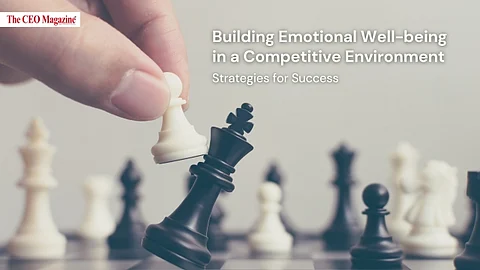
- News
- Women
- Magazine
- IndustryIndustry
- InsightsInsights
- Success Stories
- PublishPublish
- ContactContact
- Media KitMedia Kit

Building Emotional Well-being in a Competitive Environment: Strategies for Success
In highly competitive environments, maintaining emotional well-being can be challenging yet crucial for long-term success. The pressure to excel, coupled with constant comparison and stress, can take a toll on mental health. This article explores effective strategies for building and maintaining emotional well-being while thriving in a competitive setting.
In a competitive environment, individuals often face heightened stress levels, anxiety, and pressure to perform. The constant drive to outperform peers and meet high expectations can lead to burnout and emotional fatigue. Recognizing these challenges is the first step toward managing them effectively and maintaining a healthy emotional state.
The first step in managing stress is to identify its sources. Common stressors in competitive environments include tight deadlines, high expectations, and intense competition. Understanding these stressors helps in developing targeted strategies to address them.
Incorporate mindfulness practices such as meditation, deep breathing exercises, and yoga into your routine. These techniques help reduce stress, enhance focus, and promote relaxation. Regular practice can significantly improve emotional resilience and well-being.
Set achievable and realistic goals to avoid unnecessary stress. Break larger objectives into smaller, manageable tasks and prioritize them effectively. This approach helps in reducing the feeling of being overwhelmed and fosters a sense of accomplishment.
Create clear boundaries between work and personal life to prevent burnout. Set specific work hours and avoid bringing work-related tasks into your personal time. Establishing these boundaries helps in maintaining a healthy balance and protecting your emotional well-being.
Allocate time for self-care activities that rejuvenate and energize you. Engage in hobbies, exercise regularly, and spend quality time with loved ones. Self-care is essential for maintaining emotional health and managing the stresses of a competitive environment.
Don’t hesitate to seek support from friends, family, or professional counselors. Sharing your experiences and challenges with others can provide relief and valuable perspective. Support networks are crucial for emotional well-being and coping with competitive pressures.
Develop and nurture relationships with colleagues, mentors, and peers who offer support and encouragement. A positive and supportive network can provide motivation, advice, and a sense of camaraderie, which is beneficial for emotional well-being.
Encourage a collaborative rather than competitive mindset. Working together and supporting each other can reduce stress and foster a more positive work environment. Collaboration enhances teamwork and mutual respect, contributing to better emotional health.
Invest in your professional growth by seeking opportunities for learning and development. Continuous learning and skill enhancement can boost confidence and reduce anxiety associated with competition. Professional development also helps in staying relevant and motivated in your field.
Building emotional well-being in a competitive environment requires proactive strategies and self-awareness. By understanding the impact of competition, managing stress effectively, maintaining work-life balance, and cultivating positive relationships, you can thrive professionally while safeguarding your emotional health. Prioritizing emotional well-being is essential for achieving long-term success and maintaining a fulfilling and balanced career.
Follow us on Google News
